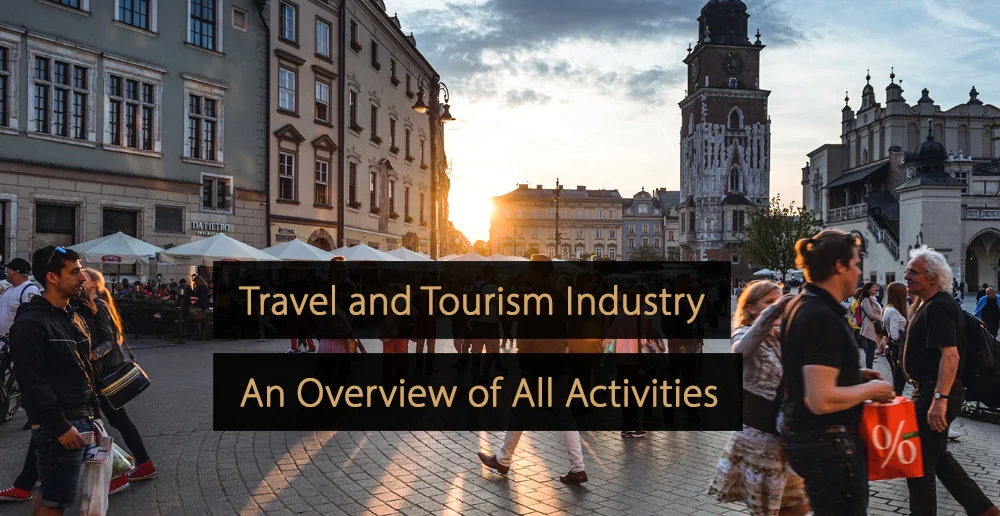The concepts of travel and tourism are very closely linked, and the travel and tourism industries overlap significantly. However, there are also differences between the terms and the two industries. In this article, you will learn more about travel and tourism and the industries based on those activities.
Table of Contents:
- What is the Tourism Industry?
- What is the Travel Industry?
- What is the Difference Between the Travel and Tourism Industry?
- Sectors and Companies Within the Travel and Tourism Industry
- Travel and Tourism Marketing
- How the Tourism Industry can Achieve Success with Revenue Management
- Work With These Travel Agencies to Boost your Bookings
- The latest Travel and Tourism Trends
- The Main Technology Trends to Watch Out For In the Tourism Industry
- How to Get Started in Tourism Management
- Travel and Tourism: Sustainable Tourism Development
- Slow Tourism in the Travel and Tourism Industry
- The Best Job Boards for Travel and Tourism Careers
- Travel Careers: Tips for Finding Travel and Tourism Jobs
- Tourism Course: Overview of Travel and Tourism Education
- Find Travel and Tourism Tools and Data With Google Travel Insights
- A Guide to Sustainable Tourism
- The Impact of COVID-19 on the Travel and Tourism Industry
- Other Related Industries
What Is the Tourism Industry?
Tourism is generally regarded as traveling to a different location for business or pleasure purposes. However, it has quite a specific definition: traveling to another environment for at least 24 hours, but for no longer than one year, for purposes related to business or leisure.
A tourist is generally only classed as such if they stay in overnight accommodation situated in the location they travel to. By its very nature, tourism involves a round trip rather than travel in one direction only. With this in mind, the tourism industry refers to all aspects of the service industry that cater to tourists.
What Is the Travel Industry?
Travel refers to the act of moving from one location to another. This can refer to long-distance, short-distance, overseas, domestic, and various other forms. Crucially, travel also includes both round trips and one-way journeys, and it covers a wide variety of different travel purposes.
The travel industry, therefore, refers to the numerous aspects of the wider service industry which cater to the needs and desires of those who have traveled from one part of the world to another.
The Difference Between the Travel and Tourism Industry
Given the definitions above, it is understandable that many people struggle to see much of a distinction between the tourism industry and the travel industry. Indeed, there is clearly a significant overlap between the two, and many of the businesses and services that cater to tourists also cater to travelers more generally.
Nevertheless, there are some notable differences. The tourism industry is concerned with people traveling for business or pleasure purposes, staying at their destination for at least one night, and returning. By contrast, the travel industry has a wider scope, covering more travel purposes and durations.
Sectors and Companies Within the Travel and Tourism Industry
1) Transportation
The transportation sector is one of the most obvious sectors that falls under both the travel and tourism umbrellas and is concerned with the movement of people from one location to another. This includes various types of travel, including air, road, rail, and water-based methods. This sector enables tourism in the first place, but also provides tourists with a means of getting around after they arrive at their destination.
Airline Industry
Air travel is one of the main ways that tourists and travelers reach their chosen destinations, and the airline industry provides various services, including scheduled and chartered flights. Companies within this sub-category may offer flights to domestic and international destinations and long-haul and short-haul flights.
Car Rental
Car rental services provide customers with temporary access to a car. These services can enable tourists or travelers actually to get to their chosen destination in the first place. Still, many customers use them after arriving, as they provide more freedom for exploration than relying on public transport.
Water Transport
As the name suggests, the water transport sub-category includes all forms of transport that carry passengers across the water. This includes ocean liners and ferries, which tend to voyage from point A to point B, and cruise ships, where transportation is not the only purpose, and the voyage itself is a huge part of the travel experience.
Coach Services
In many cases, coach services are one of the most cost-effective ways for tourists or travelers to reach their chosen destinations, and they are especially popular for day trips. However, coach travel does cater for international travel too. Moreover, local bus services also fall under this umbrella.
Railway
Railways are another popular transportation method, helping passengers to get from one location to another easily. Rail services are especially popular with domestic travelers, due to their convenience and regularity. Moreover, many major cities use subway-style rail services, facilitating quick and easy movement.
Spacecraft
A more recent form of transportation, which will become increasingly influential in the years ahead, is the spacecraft. The most famous example of a company operating within this area is Virgin Galactic, hoping to provide commercial space tourism via passenger trips into space in the near future.
2) Accommodation
The travel and tourism industries also contain the accommodation sector, with people requiring overnight accommodation for varying lengths of time. The accommodation industry offers various options for customers, catering to different tastes, budgets, and requirements. In addition to providing shelter and a place to sleep, many companies in the accommodation sector also provide various other services.
Hotels
The most popular form of accommodation for tourists is hotels, which are establishments that offer overnight stays on a short-term basis. They provide guests with private rooms, typically including an en suite bathroom and other facilities. Most hotels also provide housekeeping, room service, and laundry.
Video: What Is a Boutique Hotel Experience?
Shared Accommodation
The rise of platforms like Airbnb has increased the popularity of shared accommodation, which typically consists of a space in a house that may be shared with the owners. The accommodation itself may consist of a private room or maybe a room shared with other guests using the facility simultaneously.
Hostels
Hostels are a form of shared-room lodging where guests pay for a bed in a dormitory-style setup. Rooms will each provide multiple beds, with guests sharing kitchen and bathroom facilities. They are typically classed as a budget option and are usually provided on a self-catering basis.
Camping
A form of outdoor accommodation that uses temporary shelter, usually in a tent. Tourists and camp travelers may opt to stay at a commercial campsite, providing additional facilities or amenities. Alternatively, they might prefer to make their own campsite in a publicly accessible area, like a national park.
Bed and Breakfast
Most bed and breakfast accommodation is situated in a converted private house or pub and will provide guests with a private room for the night and breakfast in the morning. In many cases, the owner of the B&B will live in the building too. Guests may be offered en suite bathroom facilities, or they may need to share them.
Cruises
Cruises are classed as both a form of transportation and accommodation. This is because those on the cruise are allocated a cabin where they can rest, relax, and sleep. Passengers spend most of the cruise on the cruise ship, benefiting from classic accommodation services.
Farmhouse Accommodation and Agri-Tourism
Agri-tourism remains a fairly niche concept, but one which is gaining increased traction, with tourists spending time on a farm, seeing the day-to-day work that goes on first-hand, and even joining in. Farmhouse accommodation is simply accommodation that facilitates this kind of experience, and it often resembles a B&B.
Timeshare Accommodation
Finally, timeshare accommodation is where ownership is shared between multiple people, with usage rights being allocated to each owner at a different time of the year. This kind of accommodation includes condos and lodges, and owners are usually allocated usage rights for a week or two.
3) Food & Beverage
Food and drinks are basic human needs, and the food and beverage industry caters to these needs among tourists and travelers. Again, a wide range of company types falls within this sector, providing customers with various options. It is also worth noting that the food and beverage industry provides opportunities for tourists and travelers to socialize with friends or meet new people.
Restaurants
Restaurants are establishments that provide food and drink, which is primarily eaten on the premises. That said, the restaurant sub-category of the Travel and tourism industries also includes fast food restaurants and takeaways, family restaurants, diners, luxury restaurants, and other eateries.
Catering
Regarding travel and tourism, the term catering is usually used to refer to food and drink services in locations where eating and drinking are not the primary attraction. Therefore, it would not include restaurants but food and drinks sold on public transport, parks, and tourist sites.
Bars & Cafés
Bars and cafés provide a relaxed environment for travelers to eat and drink. In the case of bars, the focus tends to be on sales of alcoholic and soft drinks, while in the case of cafés, the focus tends to be on hot drinks and light snacks. Both environments also provide a place for people to socialize.
Nightclubs
Some locations in the world attract many tourists off the back of the nightlife on offer, with nightclubs being the main example. These clubs are establishments that stay open until late at night and combine music with alcohol sales. Most nightclubs also feature a stage for performers and a dance floor for guests.
4) Entertainment
Once tourists or travelers arrive at their chosen destination, they will often need entertainment, even if that is not the primary purpose of their journey. However, in many cases, companies or establishments providing entertainment are one of the major attractions drawing people to a location in the first place. Some of the sub-categories within the entertainment sector of the travel and tourism industry are outlined below.
Casino
A casino is an entertainment establishment that provides people with opportunities to gamble – primarily through luck-based cards, dice, and slot games. In addition to these games, many casinos are connected to hotels or resorts, and many also host other entertainment, such as musical or comedy performances.
Tourist Information
The tourist information sub-category is focused on providing travelers with important information about things to do in the local area. This includes offline methods, such as tourist information offices and leaflets, and online methods, such as informational websites and social media accounts.
Shopping
Shops play a varied role in the travel and tourism industries, catering to people’s basic needs, while also providing a form of entertainment. Indeed, many people travel to specific parts of the world to experience shopping in that location, including 5th Avenue in New York, Bond Street in London, and Rodeo Drive in LA.
Tourist Guides & Tours
Tourist guides offer organized tours of a location, typically taking a group of people to some of the important attractions or tourist sites nearby. The tourist guide’s role is factual information and context, helping to make the tour more interesting and educational.
5) Connected Industries
Finally, several other industries are more broadly linked to either the tourism industry, the travel industry, or both. These include companies that promote the interests of the travel industry itself, businesses that help connect customers with travel and tourism products, and organizations that provide practical support or logistical assistance for tourists and travelers.
Financial Services
Many financial services are relevant to both the tourism and travel industries. The most obvious of these include travel insurance and medical insurance products, while other examples include services linked to currency conversion and the acquisition of traveler’s cheques.
Travel Agents
Travel agents sell travel products on behalf of suppliers and generally receive a commission for doing so. They also provide customers with advice on what the best travel products are, based on the customer’s preferences and budget. In this sense, they act as an intermediary between tourists and suppliers of travel products.
Tour Operators
The role of a tour operator is to combine tour products and travel products together to sell package holidays. A package holiday will most commonly consist of air travel, accommodation, hotel transfers, and the services of holiday reps, who can provide organized activities.
Online Travel Agencies
An online travel agency will typically perform a very similar role to a more traditional travel agency, albeit using the power of the Internet. While the purpose is still to connect tourists with travel products on behalf of suppliers, there is more emphasis on self-service methods.
Video: What Is an Online Travel Agency?
Tourism Organisations
Tourism organizations tend to act in the interests of the tourism industry, lobbying on its behalf or promoting its interests. Examples include national tourism information companies, local tourist boards, tourism agencies, tourism charities, and inspection agencies.
Educational
Lastly, the educational sub-category includes businesses that deliver the kinds of education services that attract tourists and travelers. This is a growing aspect of the tourism industry and includes organizations linked to conferences, exhibitions, training activities, and certain academic institutions.
Key Travel and Tourism Industry Segments
Travel and Tourism Industry Marketing
The travel and tourism industry is one of the largest and most competitive in the world, and this means that tourism businesses can live or die based on the quality of their marketing efforts. In particular, companies like hotels, airlines, travel agents, tour operators, and car rental services must use the latest marketing methods to stand out. In the article “Tourism Marketing: Brand New Marketing Tips to Boost Your Results!” you will learn more about the importance of tourism marketing strategies and see tourism marketing tips to help you improve results.
How Travel and Tourism Industry Can Achieve Success with Revenue Management
The travel and tourism industry, including the hospitality sector, can optimize its income during low- and high-demand periods. Thanks to revenue management, businesses can assess the customers’ demand behavior to increase their income. The main objective of the revenue management strategy is to sell the right product or service to the right clients for the right price. This can only be done by understanding the customers’ perception of your service or product before being able to adjust the prices accurately. In the article ‘Revenue Management; clearly explained!’ you can learn more about how revenue management can benefit your business.
Work With These Travel Agencies to Boost your Bookings
Working with travel agencies in the travel and tourism industry can help you boost the number of bookings you generate, which can help your travel company optimize revenue. Nonetheless, it is important to understand that travel agencies differ. While some serve as one-stop shops, others specialize in a particular area, like hotels, cruises, or flights.
Read “Work With These Travel Agencies to Boost Bookings,” and you can learn more about how travel agencies can help you while having access to a list of agencies broken down according to areas of specialization.
The Latest Travel and Tourism Trends
The Tourism industry is a big business in almost every country. Yearly, millions of people travel on several occasions, spending billions of dollars. Change and evolution are more fast-paced than ever, with shifting demographics and developing technology creating brand-new travel trends. Whether the customers are local, national, regional, or international, every business owner should follow the latest tourism trends as part of their marketing effort and economic growth strategy. ‘Travel Trends: Opportunities for the Travel Industry’ is an insightful guide to the key trends reshaping the travel and tourism industry.
The Main Technology Trends to Watch Out For In the Tourism Industry
The travel and tourism industry has been transformed by technology. From online reservations to customer communication, introducing technology trends to tourism has changed travelers’ expectations and helped businesses provide guests with a more immersive experience. The upcoming tech trends in the tourism industry are explained in detail in this article, ‘ Key Technology Trends Emerging in the Travel & Tourism Industry’.
How to Get Started in Travel and Tourism Industry Management
Jobs in the tourism industry are amongst the fastest growing in the world of employment. A degree in tourism management teaches students the fundamentals on sustainability, human resources, project management, and much more. The knowledge you gain through a degree in this field will be useful for various careers. Whether you want to work in a hotel, resort, or cruise ship, or even a restaurant, the article ‘Tourism Management: All You Need to Know About Tourism’ will help you get started in this competitive industry.
Travel and Tourism: Sustainable Tourism Development
Within the broad field of travel and tourism, sustainability is receiving a greater amount of attention than ever before, leading to the emergence of slow tourism development. Essentially, this discipline is focused on creating and maintaining a fully sustainable tourism industry in a particular location.
In the article “6 Benefits of Sustainable Tourism Development,” you can explore the topic of sustainable tourism development in greater depth while also learning about its key benefits.
Slow Tourism in the Travel and Tourism Industry
Slow tourism is an emerging travel and tourism trend, which is similar to the slow-eating movement and forms a part of the broader sustainable tourism trend. It places emphasis on the enjoyment of local culture, history, and features while moving away from ‘mass tourism’ activities and packed itineraries.
In the “Slow Tourism: What It Is, Its Importance, and Examples” article, you will be able to obtain a deeper understanding of the concept of slow tourism and its importance while also reading about some key examples.
The Best Job Boards for Travel and Tourism Careers
The travel and tourism industry is competitive, so you must identify opportunities when they become available and apply for them while you have the chance. Job boards provide an excellent platform to achieve this, and many of these websites specialize in advertising travel jobs, in particular.
Read “Travel Jobs: The Best Travel Industry Job Boards for Your Career” for more information on travel jobs, along with a list of some of the main job boards that advertise positions in the industry.
Travel Careers: Tips for Finding Travel and Tourism Jobs
Travel careers are extremely appealing to many people because the travel and tourism sector offers variety, long-term prospects, and just the right level of challenge. However, securing a job is going to require you to use the right channels, put in a high-quality application, and succeed under pressure when it comes to the interview.
The article “Travel Careers: Tips to Find a Career in the Travel Industry” provides nine tips and some interesting insights to help you land the job that takes your career to the next level.
Tourism Course: Overview of Travel and Tourism Education
Travel and tourism offer excellent career prospects, and a tourism course can enhance your chances of moving into a job in the industry. Various institutions offer these courses and are designed to provide you with the knowledge and skills you will need to succeed in the various tourism positions.
You can learn much more about the tourism course options, the benefits they offer, and where to find them by reading our “Tourism Course: A Complete Overview of Courses & Tourism Educators” article.
Find Travel and Tourism Tools and Data With Google Travel Insights
Companies and individuals in the travel and tourism industry can capitalize on several Google tools and services, and Google Travel Insights is one of the most powerful examples. The platform offers data, industry insights, and integration opportunities, allowing businesses and marketers to optimize performance.
Check out “Google Travel Insights: Tools & Data Trends for The Travel Industry” for much more on the platform, what it offers the travel and tourism industry, and the three main components that make up the service.
A Guide to Sustainable Tourism
The long-term future of the travel and tourism industry relies on attractions, transportation, hospitality, and travel experiences, all becoming more sustainable and less damaging. Responsibility for sustainable tourism lies with individuals, businesses, and governments and is vital for protecting the environment, wildlife, and local people.
Read “Sustainable Tourism Guide: What is, Why Important, Examples and More…” to better understand sustainability issues in the travel and tourism industry and to read about specific examples.
Travel and Tourism Industry FAQs
The travel and tourism industries technically cater to slightly different groups of people but are extremely closely linked. In both cases, they consist of organizations within the transportation, accommodation, entertainment, food, and beverage sectors and several related industries.
Want to Learn More About Related Industries?
The hospitality industry is part of the travel industry, and the hotel industry is part of the hospitality industry. All these industries have in common is that they are large service industries worldwide and are increasingly important in the modern age. But what is the difference between the hotel Industry and the Hospitality Industry? And what are all hospitality sectors within the hospitality industry? In the following articles, you can learn more about related industries.
- Travel Industry; An Overview of One of the Largest Service Industries
- Hotel Industry; An Overview of All Different Types of Accommodations
- Hospitality Industry; Everything You Need to Know About Hospitality
- Tourism Industry; Everything You Need to Know About Tourism
- Airline Industry: All You Need to Know About The Airline Sector
- Aviation Industry: Everything You Need to Know About the Aviation Sector
- Everything You Need to Know About the Cruise Industry
- Space Tourism: Space Companies That Will Make You An Astronaut
More Tips to Grow Your Business
Revfine.com is the leading knowledge platform for the hospitality and travel industry. Professionals use our insights, strategies, and actionable tips to get inspired, optimize revenue, innovate processes, and improve customer experience.Explore expert advice on management, marketing, revenue management, operations, software, and technology in our dedicated Hotel, Hospitality, and Travel & Tourism categories.
This article is written by:
Hi, I am Martijn Barten, founder of Revfine.com. With 20 years of experience in the hospitality industry, I specialize in optimizing revenue by combining revenue management with marketing strategies. I have successfully developed, implemented, and managed revenue management and marketing strategies for individual properties and multi-property portfolios.











Very nice information!
An excellent introduction to the travel and tourism industry. Thank you!
An excellent blog to the travel and tourism industry.
Wow! There’s so much helpful information here about the travel and tourism industry. Thank you!
Fantastic information about the travel and tourism industry!
Thank you so much for the ideas and information. I’ve been working in the accommodation industry and always look for trends I can apply to get more customers.
Thank you for the detailed information, very helpful.
Your blog is like a travel and tourism Education course. Very helpful to learn more about tourism.
The globe’s beauty and diversity can be experienced through travel and tourism. Each place has its appeal and tale, from mighty mountains and stunning beaches to bustling cities and small villages. Travel allows us to widen our views, acquire fresh viewpoints, and forge enduring memories. The support of local economies, the preservation of cultural legacy, and the advancement of intercultural understanding are all greatly aided by tourism. We join a world community unified by the fact that we are all human when we travel and interact with others. The world is a beautiful and intriguing place just begging to be explored, as travel and tourism serve as a constant reminder.
Thank you so much for this informative article, very useful.
Interesting description of travel and tourism. Though both these terms are inter-related, it’s good to know their subtle differences.
Thank you for this comprehensive information about the travel and tourism industry.
Nice informational article about the tourism and travel industry.